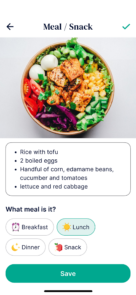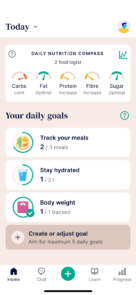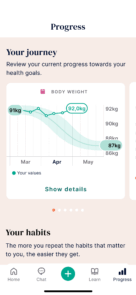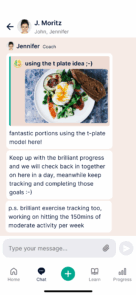
How to stop yo-yo dieting and start losing weight long-term
Have you ever been on a diet, lost a few kilograms and then started to see your weight tick up again? You’re not alone – this is a common experience known as the ‘yo-yo effect’. This phenomenon is frustrating and can hurt your motivation. However, it happens for a good reason – our bodies are trying to to protect us from harm.
The best way to avoid the yo-yo effect is by building sustainable weight loss habits instead of relying on quick fixes. You can learn to make long-term changes to your behaviour and achieve your weight loss goals with Oviva, an NHS-funded weight management programme.
Key Takeaways
- The yo-yo effect describes significant fluctuations in weight – your weight goes up and down, like a yo-yo.
- The yo-yo effect is more likely if you’re following restrictive, fad or crash diets.
- This effect is frustrating but is caused by the body’s protective mechanisms.
- If you don’t want to experience the yo-yo effect, you should avoid fad diets and focus on sustainable changes to your diet, exercise and lifestyle.
What is the yo-yo effect?
The yo-yo effect refers to significant fluctuations in weight, resulting in your weight decreasing and then increasing again.
If you’ve ever been on a very strict ‘crash diet’, you’ve probably experienced this weight rebound phenomenon yourself and asked yourself why you’re not losing weight.
First, your weight goes down, then you stop the diet, and the scales gradually start to show weight gain. In some cases, your weight can rebound so drastically that it may even end up higher than it was before you started dieting.
It gets its name as your weight goes up and down like a yo-yo. It can be frustrating, and, above all, it often reduces your motivation and desire to lose weight. However, believe it or not, the yo-yo effect happens for good reason.

Why does the yo-yo effect happen?
The yo-yo effect is caused by your body’s evolutionary protective functions.
In the past, people didn’t have the oversupply of food that a lot of us experience today. Sometimes, the already scarce food supply became even scarcer, with people approaching starvation. The human body evolved to react to this by changing its metabolism.
Your body switches to what is known as ‘starvation mode’, which means that it reduces your basal metabolic rate. As a result, your body slows down the rate at which you burn energy.
Your body cannot distinguish between a real famine and these restrictive diets, even if your brain knows what’s happening. If your body takes in very few calories, it slows your metabolism and protects you from starvation. This is intended to preserve vital functions.
Basal metabolic rate (BMR)
Your basal metabolic rate, sometimes shortened to BMR, is the amount of energy your body needs to stay fully functional while at rest.
With so-called crash diets, your daily calorie intake is drastically reduced to the point that the daily energy intake during a diet is significantly below your basal metabolic rate. This gives your body a clear signal to slow your metabolism down.
When you end your diet, your body remains in this conservation mode. So, rather than using the calories you’re eating for energy, it prioritises storing them as fat, fearing another period of scarcity.
As a result, your weight quickly increases after the diet, and you experience the yo-yo effect.
Due to the low energy intake from significantly reduced calories, your body needs to use its energy reserves. It does that by breaking down protein in your muscles to use as energy, so your muscle mass decreases.
And if you lose muscle mass, the yo-yo effect becomes even stronger. Muscle burns more energy than fat, even when you’re resting. So, if you lose muscle, your body needs less energy to function each day. This tells your metabolism to slow down, making it harder to lose weight or keep it off, even if you’re eating the same amount of food as before the diet.

Post-diet cravings
Another response of this survival mechanism is that, if the diet has deprived your body of essential nutrients or energy, your body may trigger cravings, urging you to seek out high-calorie foods to restore balance.
Additionally, extreme diets can cause imbalances in hunger hormones, like ghrelin (which stimulates appetite) and leptin (which signals fullness), making you feel hungrier and more likely to crave foods that give a quick energy boost, like sweets or carbs.
After the diet ends, your body may also “overcompensate” for the restriction, leading to strong cravings and overeating.
How do I avoid the yo-yo effect?
If you want to lose weight sustainably and avoid the yo-yo effect, be patient and try to adopt a healthier and more balanced diet.
If you really want to lose weight and keep it off, it is vital to have a long-term strategy. Gradual weight loss through making sustainable changes can be effective. This way, your body still receives enough energy and isn’t placed into ‘starvation mode’.
Short-term, intensive diets, such as supervised Total Diet Replacement, should only ever be used as part of a medical programme like Oviva and carried out under supervision from healthcare professionals. It’s fundamental that they are followed up with a long-term plan to sustain healthy weight management habits and minimise weight regain.

Guidance towards a healthy, long-term weight
Oviva’s weight management programme is designed to be so much more than a simple diet. Rather than forcing yourself to restrict food groups, cut calories, or go to intense gym classes that you hate, it’s about helping you build healthy habits so that your mindset and behaviour to food and exercise changes. That’s how you sustain healthy weight loss and weight management for the long term.
You’ll learn to lose weight sustainably, with a focus on nutritious foods and positive behaviours.
At Oviva, we don’t believe in yo-yo dieting or strict rules about foods to avoid. Instead, we focus on personalised care, long-term weight management and a healthy, balanced lifestyle.
It’s worth noting that this programme is specifically for those with a BMI of at least 35 and weight-related health conditions like type 2 diabetes or high blood pressure.
Never count calories again
Simply record your daily meals using a photo food diary directly in the Oviva app. This way, you know exactly what you’re eating, and you can easily refer back to previous days.
Be motivated – and stay motivated
Learn to set realistic, measurable goals that’ll bring you closer to your ideal weight.
Your goal is always in sight
Track your progress. Every step brings you closer to your goal and strengthens your motivation.
Develop your knowledge
By learning about nutrition, exercise, motivation, and mental health, you’ll develop your knowledge, build coping strategies, and become a weight loss expert.
Support from expert coaches
You’ll have contact with a team of healthcare professionals, including dietitians and psychologists, who will provide expert advice and support and ensure you have the right strategy.
Adapted for your lifestyle
Oviva’s approach can be tailored to your specific circumstances. Whether you’re working long hours, looking after children, or busy with your hobbies, you can adapt Oviva’s lessons to suit your lifestyle. This makes it easier to stay motivated and on the right path.

10 tips for losing weight without yo-yo dieting
Tip 1: Avoid too high a calorie deficit
While you want to achieve a calorie deficit for weight loss, crash diets are not sustainable over the long term and may not be the right approach.
The NHS recommends aiming to reduce your calorie intake to around 600 kcal below the recommended daily calorie intake. This means around 1,900 kcal for men and 1,400 kcal for women. More intense weight loss strategies should only be carried out with professional support and when medically recommended.
However, you don’t necessarily need to count calories. You can achieve long-term results by focusing on your portion sizes and balance on your plate.
Tip 2: Focus on long-term changes
Quick-fix diets are ineffective and often lead to weight regain. The yo-yo effect is what prevents you from being able to maintain the weight loss you achieve during a diet of this kind.
Instead, focus on a healthy, balanced diet that fits into your everyday life and that you enjoy. This enjoyment is vital for achieving lasting weight management because it allows you to follow the diet for the foreseeable future and not just for a few weeks.
Tip 3: Embrace healthy snacking
Learning to prepare nutritious meals is important, but what happens when you feel the urge for a snack? It’s best to plan ahead and have some healthy snack options in the house.
For example:
- A small handful of unsalted nuts or seeds
- Roasted chickpeas
- Natural yoghurt with a little honey
- Vegetable sticks with hummus
- A boiled egg

Tip 4: Get more exercise in everyday life
Exercise burns calories, boosts your metabolism, and can help minimise muscle loss. This is important for optimising your basal metabolic rate. In other words, exercise is your secret weapon if you want to lose weight without the yo-yo effect.
If the thought of going to a gym is unappealing, don’t worry. There are plenty of options you can use to increase the amount of physical activity you do in your everyday life.
For instance:
- Choose to take the stairs instead of a lift or escalator
- Walk more often – to the shops, the post office, or just around the block
- For longer journeys, you could hop on your bike
- See housework as a workout. An hour of mixed household chores burns around 200 calories – similar to the calories burned at the gym – and you’ll have a clean house!
Tip 5: Pay attention to your protein intake
Unfortunately, if you reduce your calorie intake too much, you’ll not only lose fat but also muscle mass. You need to take sensible steps to counteract this.
To reduce the loss of muscle mass, it’s important to exercise and to eat enough protein. Healthy, high-protein foods include chicken, fish, meat, eggs, milk, cheese, nuts, lentils, beans, chickpeas, seeds and peanut butter. Try to include a good protein source with each meal.
Tip 6: Enjoy a variety of vegetables
There is a wide range of vegetables to choose from, all with great nutritional value: broccoli, carrots, cucumber, tomatoes, sweet corn, celery, kale, onions, lettuce and more. The NHS recommends aiming for five portions per day, with 80 g making up one portion.
Vegetables contain few calories and lots of healthy fibre. They also supply our bodies with essential vitamins and minerals. Make vegetables one of the main pillars of your diet.
Aim for various vegetables and use them to fill half your plate at lunch and dinner.
Tip 7: Eat healthy fats
Some fats are essential for good health, but not all fats are the same. Try to choose healthier fat options such as olive oil, rapeseed oil, nuts, nut butters and seeds.
These are much better for your heart than saturated fats, such as those from red meat, cream and butter. Oily fish can also provide omega-3 fats, which have proven benefits for heart health. All fats are high in calories, so avoid large amounts of fat, even healthy fats.

Tip 8: Adjust your shopping habits
Make some sensible and sustainable adjustments to your shopping habits. For example, try to get used to making a shopping list and sticking to it. Steer clear of the aisles with less healthy foods that may tempt you, like chocolate, and keep to the items on your shopping list.
Avoid shopping while hungry and try to focus on filling your trolley with items like:
- Fruit and vegetables
- Nuts and seeds
- Beans, pulses and chickpeas
- Natural yoghurt
- Eggs
- Rice
- Oatmeal
- Whole wheat pasta
- Fish
- Lean meat
Aim for fresh and natural foods as much as possible, and reduce your ultra-processed food intake.
Remember to get some healthy snacks for moments when cravings hit between meals. Carrot sticks, hummus, grapes, apples and natural yoghurt are great options.
Oviva patient success stories:

 -22kg
-22kg
Heidi (53)

 -25kg
-25kg
Martin (34)

 -32kg
-32kg
Patricia (53)
Tip 9: Reduce your stress levels
Tiredness makes you crave sweets, and the stress hormone cortisol promotes fat storage. Getting enough sleep and reducing your stress levels should be part of your weight loss programme. Relax with something that’s good for you, such as:
- A walk in the fresh air
- A warm bath
- Listening to music
- A cup of tea and a book
- A puzzle
You could also consider yoga, meditation or learning some breathing exercises. You can find numerous video tutorials aimed at beginners for each of these on YouTube.
Tip 10: Get professional support
The best way to achieve lasting weight loss is by making sustainable changes to your lifestyle, but this requires knowledge, motivation and perseverance. You don’t need to do this alone. If you’re eligible for the Oviva programme, speak to your GP and access professional support.
The Oviva programme is NHS-accredited and focuses on diet, exercise and mental health to promote long-term weight management with lasting results.
You don’t need to take our word for it: 97% of Oviva users say they’d recommend us to others, and the average weight loss over 12 months is 13.6 kg.








